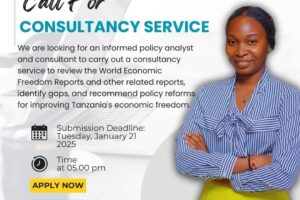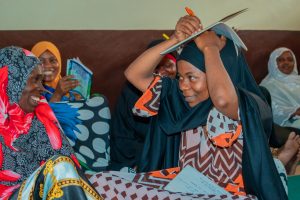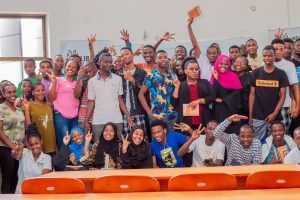
Tanzania Students For Liberty Conference
As we are approaching the pick of Nyerere Day on Sunday of 14th October 2014, the nation particularly leaders are trying to assess whether the current policy of Industrialization can well be implemented under the social-economic and political stances built by Baba wa Taifa from the very first days of the national independence. What is put on the table for memorizing, meditation, contemplation, discussion and way forward is all about building the national industrial development on the basis of equality, freedom, humanity, individual and national self-reliance capability and so many other characteristics which reflects Mwalimu’s legacy.
Many have been discussed so far especially during this second week of October, not only in the media but also in special platforms such the one of hosted by Mwalimu Nyerere Memorial Academy on 10th and 11th October, and being attended by different leaders including Prof. Joyce Ndalichako, the Minister of Science and Technology. In that forum, the main theme was “Mwalimu Nyerere’s Philosophy on Self-Reliance and Industrial Development.
In my opinion, I would like to see that we are referring Mwalimu’s philosophical stances by understanding the Tanzania of that time and the type of economy which he tried to pursue in relation to the realities of the current environment within and outside Tanzania. It is obvious that Mwalimu was pursuing Agro-based economy and he had a genuine reason for that paying attention to majority of Tanzanians were peasants, thus even if his government offered education to the students to take some few white colour jobs he made sure that at least in their mind they know it’s all about agricultural based economy which the nation was and its government was trying to build.
Even the education curricula of the institutions were designed to accommodate that mentality if anyone today had to find the type of books which were used to teach students those days, no surprise will find “Sayansi kilimo” and so many others relating to that as major textbooks used in schools. Mwalimu knew education is a tool but irrelevant education is a waste and a death to the nation, that’s why he made sure that all graduates by the time they are reaching the so-called “LY” Last Year if not STD 4, 8 and 12 by that time they should at least know how to make “Kitalu” and “Tuta la mboga” for their own farms if not village farms.
Moreover, almost every school had its own “Shamba” and students were entitled to take care of those farms. Students were theoretically taught agricultural science in classrooms and were made to experience the importance of “Kilimo ni Uti wa Mgongo” by practising the agricultural knowledge in school’s farms to produce food for their own. If the government had to take care of them well, that would be in other necessities but schools were teaching students to be self-reliant in so many different ways but the most of all was through agriculture because that was the type of the national economy (Agro-based economy) which Mwalimu was determined to build.
One might see a very complete package of Social, Economic and Political Philosophy of Mwalimu because it is well contented and still addressing the very needs of the Tanzanian ordinary people even today perhaps without a need of altering even a dot, but the “opposite” can well be seen if one will try to take a little glance at the current realities. The “opposite” here doesn’t mean completely irrelevance or unworthy it, rather the incompatibility of educational framework or structure with the Industrialization Policy that we are hustling to achieve. A quick guide here is this “Mwalimu was building an Agro-based economy so he taught people “Kilimo” yet we are determined to build an Industrial-based economy so we teach people what?”
The main target here is seeing Mwalimu’s philosophical stances work out in the process of realizing our industrial policy. Since we know now very well what kind of economy we are building and so very determined to build that, we must go further to prepare the mindset of Tanzanians (students in particular) exactly like Mwalimu once did. The only and only way to do that is first by asking ourselves the most salient questions concerning with our education and be able to answer specific questions which build premises for answering a general question “what kind of education are we offering our people?”. Apart from land and raw materials which we already have, and money which we can simply get from loans and shares, Industries needs entrepreneurs, innovators, inventors, marketers, good managers who really knows how to get things done, science and technology.
The question is, our education is well set to groom up these young talented Tanzanians so that they can steer the industrial economy which we are building? Are we really train them practically as Mwalimu did? Does our schools give them chances to come up with crazy ideas of innovations, inventions and business while studying? Do our schools have special centres to protect kids who are born talented, naturally gifted so that they can use such ability to bring on new ideas or are they being ruined by making them believe in exams? There are so much more to check in our education sector if we really want to see Mwalimu’s philosophies through a clear sight.
“Mwalimu Nyerere’s Philosophy of Self Reliance and Industrial Development is well cemented upon strong determination, clear vision and national goals of that time, and implemented within a well-structured education system which is good for us to grasp some useful lessons. For Sera ya Viwanda to succeed we must build a relevant education system that will help to not only educating the industrial generation how to get things done but also setting up the mindset of the entire nation and stay focussed on the industrialization.

Maps360 – +255 759 232 582 [email protected]



